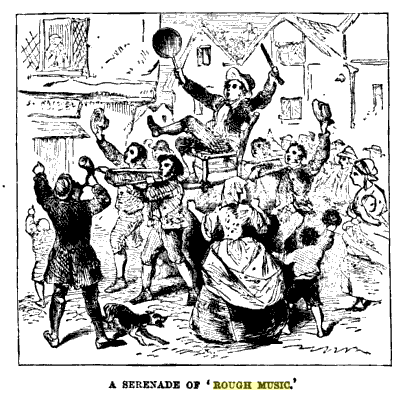
Repertoire of contention
Encyclopedia

Social movement
Social movements are a type of group action. They are large informal groupings of individuals or organizations focused on specific political or social issues, in other words, on carrying out, resisting or undoing a social change....
theory, to the set of various protest-related tools and actions available to a movement or related organization in a given time frame.
Repertoires are often shared between social actors; as one group (organization, movement, etc.) finds a certain tool or action successful, in time, it is likely to spread to others. However, in addition to providing options, repertoires can be seen as limiting, as people tend to focus on familiar tools and actions, and innovation outside their scope is uncommon (see diffusion of innovations
Diffusion of innovations
Diffusion of Innovations is a theory that seeks to explain how, why, and at what rate new ideas and technology spread through cultures. Everett Rogers, a professor of rural sociology, popularized the theory in his 1962 book Diffusion of Innovations...
).
Actions and tools that belong to common repertoires of contention include, but are not limited to: creation of special-purpose associations and coalitions, public meetings, solemn procession
Procession
A procession is an organized body of people advancing in a formal or ceremonial manner.-Procession elements:...
s, vigils
Vigils
Vigils is a term for night prayer in ancient Christianity. See Vespers, Compline, Nocturns, Matins, and Lauds for more information. A Vigil is a night spent in prayer....
, rallies
Rally
Rally refers to a gathering, as in:* Political rally, a demonstration, march, or parade* Pep rally, an event held at a United States school or college sporting eventRally as a sports term can also refer to:* Rallying, a category of motorsport...
, demonstration
Demonstration
Demonstration may refer to:* Demonstration , a political rally or protest* Demonstration , a conclusive mathematical proof* Demonstration , a method of teaching by example rather than simple explanation...
s, sit-in
Sit-in
A sit-in or sit-down is a form of protest that involves occupying seats or sitting down on the floor of an establishment.-Process:In a sit-in, protesters remain until they are evicted, usually by force, or arrested, or until their requests have been met...
s, petition
Petition
A petition is a request to do something, most commonly addressed to a government official or public entity. Petitions to a deity are a form of prayer....
drives, statements to and in public media
Mass media
Mass media refers collectively to all media technologies which are intended to reach a large audience via mass communication. Broadcast media transmit their information electronically and comprise of television, film and radio, movies, CDs, DVDs and some other gadgets like cameras or video consoles...
, boycott
Boycott
A boycott is an act of voluntarily abstaining from using, buying, or dealing with a person, organization, or country as an expression of protest, usually for political reasons...
s, strikes and pamphleteering. Repertoires change over time, and can vary from place to place. They are determined both by what the actors know how to do, and what is expected from them. Early repertoires, from the time before the rise of the modern social movement
Social movement
Social movements are a type of group action. They are large informal groupings of individuals or organizations focused on specific political or social issues, in other words, on carrying out, resisting or undoing a social change....
, included food riot
Food riot
Food and bread riots are caused by harvest failures, incompetent food storage, hoarding, poisoning of food, or attacks by pests like locusts. When the public becomes too desperate in such conditions, they attack shops, farms, homes, or government buildings to attain bread or other staple foods like...
s and banditry
Banditry
Banditry refers to the life and practice of bandits which the Oxford English Dictionary defines as "one who is proscribed or outlawed; hence, a lawless desperate marauder, a brigand: usually applied to members of the organized gangs which infest the mountainous districts of Italy, Sicily, Spain,...
. The changing nature of repertoires of contention can be seen in a sample element of the mid-18th century British
Great Britain
Great Britain or Britain is an island situated to the northwest of Continental Europe. It is the ninth largest island in the world, and the largest European island, as well as the largest of the British Isles...
repertoire of contention, the rough music
Rough music
Rough music, also known as ran-tan or ran-tanning, is an English folk custom, a practice in which a humiliating and loud public punishment is inflicted upon one or more people who have violated the standards of the rest of the community...
: a humiliating and loud public punishment inflicted upon one or more people who have violated the standards of the rest of the community. For yet another example, consider that in the recent years, Internet
Internet
The Internet is a global system of interconnected computer networks that use the standard Internet protocol suite to serve billions of users worldwide...
-focused repertoires have been developed (see hacktivism
Hacktivism
Hacktivism is the use of computers and computer networks as a means of protest to promote political ends. The term was first coined in 1994 by a member of the Cult of the Dead Cow hacker collective named Omega...
). Recent scholarship has introduced a notion that in addition to the "traditional" and "modern" repertoires, a new, "digital", repertoire may be emerging.
While the term is used most often in the social movement theory context, it can be applied to any political actors. Repertoires of contention also existed before the birth of the modern social movement (a period most scholars identify as the late 18th to early 19th century).
The term is attributed to Charles Tilly
Charles Tilly
Charles Tilly was an American sociologist, political scientist, and historian who wrote on the relationship between politics and society. He was the Joseph L. Buttenwieser Professor of Social Science at Columbia University....
.

